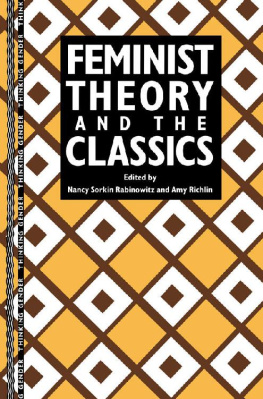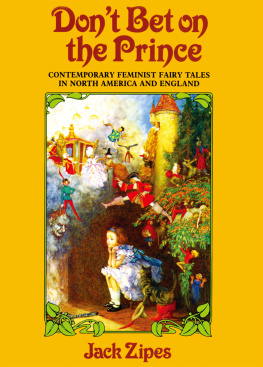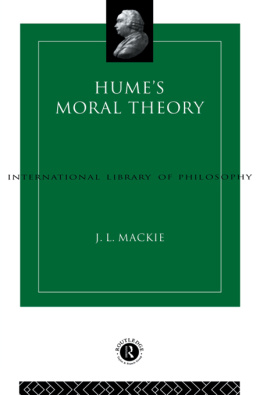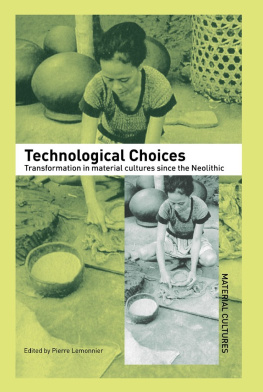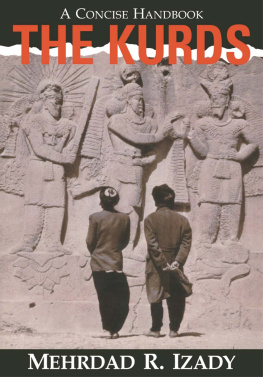Nancy Sorkin Rabinowitz - Feminist Theory and the Classics
Here you can read online Nancy Sorkin Rabinowitz - Feminist Theory and the Classics full text of the book (entire story) in english for free. Download pdf and epub, get meaning, cover and reviews about this ebook. year: 1993, publisher: Routledge, genre: Science. Description of the work, (preface) as well as reviews are available. Best literature library LitArk.com created for fans of good reading and offers a wide selection of genres:
Romance novel
Science fiction
Adventure
Detective
Science
History
Home and family
Prose
Art
Politics
Computer
Non-fiction
Religion
Business
Children
Humor
Choose a favorite category and find really read worthwhile books. Enjoy immersion in the world of imagination, feel the emotions of the characters or learn something new for yourself, make an fascinating discovery.
- Book:Feminist Theory and the Classics
- Author:
- Publisher:Routledge
- Genre:
- Year:1993
- Rating:5 / 5
- Favourites:Add to favourites
- Your mark:
- 100
- 1
- 2
- 3
- 4
- 5
Feminist Theory and the Classics: summary, description and annotation
We offer to read an annotation, description, summary or preface (depends on what the author of the book "Feminist Theory and the Classics" wrote himself). If you haven't found the necessary information about the book — write in the comments, we will try to find it.
Feminist Theory and the Classics — read online for free the complete book (whole text) full work
Below is the text of the book, divided by pages. System saving the place of the last page read, allows you to conveniently read the book "Feminist Theory and the Classics" online for free, without having to search again every time where you left off. Put a bookmark, and you can go to the page where you finished reading at any time.
Font size:
Interval:
Bookmark:

Thinking Gender
Edited by Linda Nicholson
Also published in the series
Feminism/Postmodernism
Linda Nicholson
Gender Trouble
Judith Butler
Words of Power
Andrea Nye
Femininity and Domination
Sandra Bartky
Disciplining Foucault
Jana Sawicki
Beyond Accommodation
Drucilla Cornell
Embattled Eros
Steven Seidman
An Ethic of Care
Mary Jeanne Larrabee
Materialist Feminism and the Politics of Discourse
Rosemary Hennessy
Feminist Epistemologies
Linda Alcoff and Elizabeth Potter
Gender Politics and Post-Communism
Nanette Funk and Magda Mueller
Engenderings
Naomi Scheman
FEMINIST THEORY
AND THE
CLASSICS
Published in 1993 by
Routledge
270 Madison Ave,
New York NY 10016
Published in Great Britain by
Routledge
2 Park Square, Milton Park,
Abingdon, Oxon, 0X14 4RN
Transferred to Digital Printing 2010
Copyright 1993 by Routledge
All rights reserved. No part of this book may be printed or reproduced or utilized in any form or by any electronic, mechanical or other means, now known or hereafter invented, including photocopying and recording, or in any information storage or retrieval system, without permission in writing from the publisher.
Library of Congress Cataloging-in-Publication Data
Feminist theory and the classics / edited by Nancy Sorkin Rabinowitz
and Amy Richlin.
p. cm.(Thinking gender)
Includes bibliographical references and index.
ISBN 0-415-90645-8. ISBN 0-415-90646-6 (pbk.)
1. Classical literatureHistory and criticismTheory, etc. 2. Feminism and literatureGreece. 3. Feminism and literatureRome. 4. Women and literatureGreece. 5. Women and literatureRome. 6. Sex roles in literature. I. Rabinowitz, Nancy Sorkin.
II. Richlin, Amy, 1951. III. Series.
PA35.F46 1993
| 880.09dc20 | 92-40745 |
| CIP |
British Library Cataloguing-in-Publication Data also available.
Publishers Note
The publisher has gone to great lengths to ensure the quality of this reprint but points out that some imperfections in the original may be apparent.
For all our sisters
Nancy Sorkin Rabinowitz
Shelley P. Haley
Judith P. Hallett
Barbara K. Gold
Diana Robin
Marilyn B. Skinner
Bella Zweig
Tina Passman
Peter W. Rose
Shelby Brown
Amy Richlin
The co-editors want first to thank each other for many happy hours of co-editing, from the first phone call when we hatched the idea for the original panel to the last spasms of copy-editing and proofreading. To the contributors go our heartfelt thanks for the enthusiasm with which they wrote and rewrote; they have challenged our notions and inspired us to think through the issues posed by the volume in new and creative ways. This volume grows out of long years of struggle in sisterhood and friendship, as well as from thinking, writing, and talking about feminism and classics. In very real ways, our writing has been made possible by this context of activism and by the work of many others in our double field; the chapter bibliographies and appendix show our debt to the rich work on women in antiquity and in feminist thought. We hope our readers will go further.
Institutional backing is always essential in such an undertaking. Hamilton College and the University of Southern California have provided moral and financial support; our work was made possible by the invaluable assistance of our administrative staff, as well as by the availability of copy machines, phones, and express mail (where would we have been without it?). Special thanks to Sandra Westover for her eagle eye.
We came to Routledge having heard of the miracles wrought by our editor, Maureen MacGrogan, and we are now true believers. She has urged us forward at each stage of the process, but was patient when patience was required. We thank her and Linda Nicholson for their boundless confidence in the project.
This last paragraph is the traditional place for rewarding families for having to put up with the foibles of writers. A paragraph seems hardly enough under the circumstances; this one stands for a lot. Nancy Sorkin Rabinowitz thanks Peter for reading (and editing) every word she writes, Michael and Rachel for graciously allowing her to tie up the phone and the computer, and Sophie Sorkin for being such a tough act to follow. Amy Richlin wants to say here how proud she will always be of the shining example of her father, Samuel Richlin, womens studies major and A student; and thanks her mother, Sylvia Richlin, for making sure she keeps doing her homework. We love you all; this book is one result of all your years of help, understanding, and love.
Although we have made every effort to avoid special usages, this book may contain some abbreviations standard in the field of classics but unfamiliar to those outside it; lists of such abbreviations may be found at the beginning of the Oxford Classical Dictionary. The Loeb Classical Library series provides a convenient set of translations of most Greek and Latin texts.
Feminist Theory and the Classics: in many ways our title is not surprising, growing out of a decade of feminist examinations of the traditional disciplines, such as Feminism and Anthropology (1988) or Feminism and Philosophy (1985), or attempts to make connections to other theoretical perspectives, as in the unhappy marriage of Marxism and feminism, or Feminism and Foucault.
Yet the pairing of feminist theory and the classics is also different from these others. The fact is that classics has, with few exceptions, been anti-theory in general and anti-feminist in particular. In the Modern Language Association, feminism may be under attack as not radical enough, but in the American Philological Association, it is still very radical indeed (Richlin 1991).
The and in our title attempts, la Tarzan, to throw a line over a ravine that has blocked many of us who work in both fields. There are discursive differences that have made writing this introduction deeply troublesome for me. For instance, academic feminists tend increasingly to ask who is speaking and for whom, while in classics such questions are taken to be irrelevant (more on this later). Should I speak in the disembodied voice of the volume, trying to represent the multiple positions of the individual authors, or in my own voice? The former evenhanded approach might seem ideal, but heightened feminist sensitivity to difference among women has made any form of generalization problematic; thus, to say classicists do x may ignore many of my good friends who are classicists and who are trying not to do x. Simultaneously, other controversies within feminism have raised consciousness about the partiality of subjectivity: If I decide just to speak for myself, which of my many voices would I adopt? I come up against the multiplicity of my subject positions: I am a white, bourgeois, Jewish woman, who is married with children, as well as a Hellenist, a member of a Comparative Literature department teaching feminist literary criticism, and an activist feminist. Much of what I say in the rest of the introduction is then partial, based on my own perspective as a double outsider to classics, but I have also tried to describe and represent the points of view of the other contributors.
Font size:
Interval:
Bookmark:
Similar books «Feminist Theory and the Classics»
Look at similar books to Feminist Theory and the Classics. We have selected literature similar in name and meaning in the hope of providing readers with more options to find new, interesting, not yet read works.
Discussion, reviews of the book Feminist Theory and the Classics and just readers' own opinions. Leave your comments, write what you think about the work, its meaning or the main characters. Specify what exactly you liked and what you didn't like, and why you think so.

